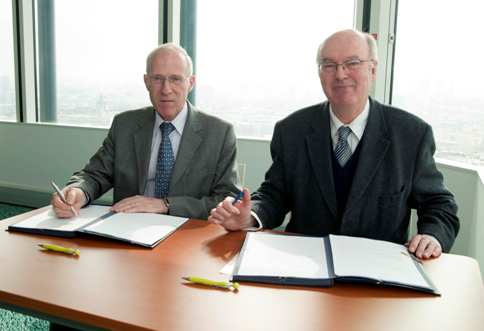Renewal of the framework agreement between UPMC and SOLEIL
On the 9th March 2011, Pierre and Marie Curie University (UPMC) and SOLEIL signed the renewal of the framework agreement governing bilateral collaborations between both organizations. This is the first renewal of the first framework agreement signed between SOLEIL and a French university, in 2004.
One of these agreements includes the financial contribution of UPMC, in association with the Ile de France Region and ANR, to a project of over one million euros, which will allow the setting up of an "ambient pressure" photoemission spectroscopy station on the TEMPO beamline at SOLEIL (described at a later date on this website), an exceptional tool for catalysis.
Parallel to the leading scientific collaboration that has blossomed for several years between groups at SOLEIL and UPMC, such agreements further facilitate the exchange of knowledge and know-how via, for example, trans-disciplinary workshops, organization of thematic information days, etc, making it easier to identify possible mutual benefits. Since then, current and potential users of the synchrotron associated with the UPMC have become more and more aware of the capabilities and specificities of the various techniques offered by SOLEIL, which allows them to optimize the synchrotron use. As a consequence, the users associated with the UPMC represent almost 6% of the total number of SOLEIL users, which makes them the first group of French SOLEIL users.
Vice versa, this will also allow researchers from SOLEIL to work with UPMC on University research or training and develop collaborations.
Such exchanges are good examples of fertile scientific partnerships and this is why SOLEIL is working to set them up with all scientific communities that could benefit from its equipment and expertise.
For further information, contact Jean-Pierre Caminade, Partnership Manager at SOLEIL

